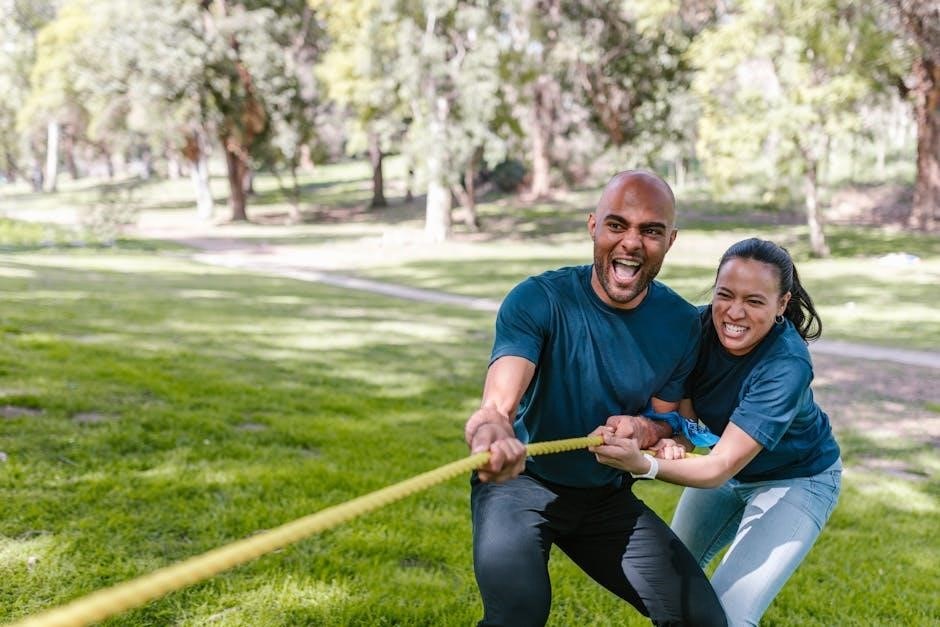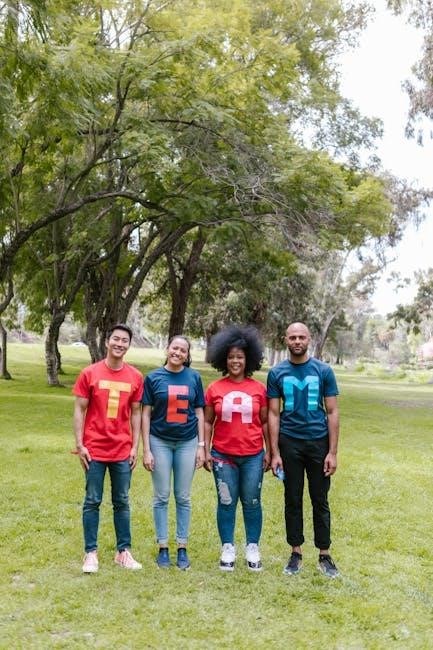Word retrieval exercises are essential for improving vocabulary, communication, and cognitive function in adults. These activities, often used in speech therapy, help address aphasia, dementia, and other language impairments. Engaging and personalized, they promote linguistic agility, memory recall, and expressive language skills, making them invaluable for both therapy and self-improvement.
Overview of Word Retrieval Exercises
Word retrieval exercises are interactive activities designed to enhance vocabulary, cognitive function, and communication skills in adults. These exercises often include word relationships, categories, and generative naming tasks, which are engaging and tailored to individual needs. They are frequently used in speech therapy to address aphasia, dementia, and other language impairments. Many exercises are available in PDF formats, offering flexibility for both individual and group settings. By focusing on visuals, examples, and personalized learning, these tools provide a dynamic approach to improving linguistic agility and memory recall, making them invaluable for adults seeking to enhance their language abilities.
Importance of Word Retrieval for Adults
Word retrieval is crucial for adults as it enhances communication, cognitive function, and confidence in daily interactions. It helps address language impairments from conditions like aphasia or dementia, improving vocabulary and memory recall. Engaging in these exercises fosters independence in expressing thoughts and ideas, making them essential for both personal growth and therapeutic recovery. Regular practice can significantly improve linguistic agility, enabling adults to navigate conversations and tasks with greater ease and precision.

What is Word Retrieval?
Word retrieval, or word finding, is the ability to access and use the correct words during communication. It is crucial for effective expression and language processing.
Definition and Explanation
Word retrieval, or word finding, refers to the ability to access and use the correct words during communication. It is a critical language skill that enables effective expression and comprehension. Difficulties in word retrieval can stem from cognitive impairments, aphasia, or dementia. Exercises designed for adults focus on improving vocabulary, memory recall, and linguistic agility through engaging tasks like naming categories, opposites, and synonyms. These activities enhance expressive language, thought organization, and attention, making them invaluable for therapy and self-improvement.
Word Finding Strategies
Effective word finding strategies include taking time to relax, visualizing the word, and using gestures or first letters as cues. Describing the word or its context can also help. Breaking down complex words into simpler parts or relating them to known concepts enhances retrieval. Additionally, organizing thoughts and practicing regular exercises improve linguistic agility and memory recall. These strategies are particularly beneficial for adults with aphasia or cognitive impairments, aiding in expressive language and communication confidence.

Benefits of Word Retrieval Exercises
Word retrieval exercises enhance vocabulary, improve communication, and boost cognitive function. They strengthen memory recall, linguistic agility, and confidence, benefiting adults with aphasia, dementia, and other language challenges.
Improving Vocabulary and Communication Skills
Word retrieval exercises enhance vocabulary by focusing on word relationships, categories, and generative naming tasks. These activities strengthen linguistic agility, helping adults express thoughts clearly and maintain conversations. By practicing word-finding strategies, individuals build confidence in communication, improving their ability to articulate ideas effectively. Engaging tasks, such as defining words or completing sentences, make learning enjoyable and tailored to personal needs, fostering better expressive language skills for adults with aphasia, dementia, or other language challenges.
Enhancing Cognitive Function and Memory Recall
Word retrieval exercises strengthen cognitive function by challenging the brain to recall and organize information efficiently. Activities like word relationships and generative naming tasks improve memory recall, helping adults remember specific words and their meanings. These exercises also enhance problem-solving skills and thought organization, making it easier to access and use language effectively. Regular practice sharpens neural pathways, boosting overall cognitive agility and supporting individuals with conditions like aphasia or dementia to maintain mental clarity and independence.
Types of Word Retrieval Exercises
Exercises include word relationships, categories, and generative naming tasks. These activities focus on opposites, synonyms, and analogies, enhancing vocabulary and cognitive skills in adults.
Word Relationships and Analogies
Word relationships and analogies are core exercises that enhance vocabulary and cognitive function. Activities include identifying opposites, synonyms, and words with multiple meanings. For example, participants might match “hot” with “cold” or “happy” with “joyful.” Analogies, such as “pencil is to write as brush is to paint,” improve understanding of word connections. These exercises are engaging and effective for adults, promoting linguistic agility and clearer communication. They are particularly beneficial for those with language impairments or seeking self-improvement, fostering better thought organization and expressive language skills.
Word Categories and Generative Naming Tasks
Word categories and generative naming tasks are effective exercises that challenge adults to list words within specific groups, such as holidays, food, or occupations. These activities enhance vocabulary, cognitive recall, and linguistic agility. For example, naming “animals that live in the ocean” or “types of fruit” stimulates word retrieval and organizational skills. Generative tasks also encourage creative thinking and expressive language, making them ideal for both individual practice and group settings. They are particularly useful for adults with aphasia or dementia, helping to rebuild vocabulary and improve communication abilities in a structured yet engaging way.
Specific Letter Categories and Word Structure
Exercises focusing on specific letter categories and word structure help adults improve vocabulary and cognitive recall. For example, listing words that start with a given letter enhances linguistic agility. These tasks also involve identifying word parts, such as prefixes and suffixes, to better understand word meanings. Activities like naming “animals starting with ‘C'” or “foods beginning with ‘T'” are both challenging and engaging. Such exercises are particularly beneficial for adults with aphasia or dementia, as they aid in rebuilding language skills and promoting clear communication in a structured and therapeutic manner.

Word Retrieval Exercises for Adults
Engaging and personalized exercises improve vocabulary, cognitive function, and communication skills; These activities, designed for adults, address word-finding challenges through structured and adaptable tasks, enhancing linguistic proficiency effectively.
Engaging Content and Personalized Learning
Engaging content in word retrieval exercises for adults combines visuals, examples, and interactive tasks to teach effective word-finding strategies. Personalized learning encourages clients to tailor exercises to their needs, enhancing relevance and motivation. These activities, such as word relationships and generative naming, are designed to be fun and adaptable, catering to individual cognitive skills. By incorporating real-life examples and thought-provoking challenges, adults can improve vocabulary, communication, and linguistic agility in a supportive and dynamic learning environment.
Functional Word Retrieval Activities
Functional word retrieval activities are designed to enhance communication skills through practical, real-life applications. These exercises often involve tasks like naming categories, describing events, or completing sentences. Workbooks and printable resources provide structured yet flexible tools for adults to practice word finding. By focusing on everyday scenarios, these activities help improve expressive language, thought organization, and attention. They are particularly beneficial for individuals with aphasia or cognitive impairments, offering a clear path to rebuilding vocabulary and confidence in daily interactions.
Compensatory Strategies and Cueing Techniques
Compensatory strategies and cueing techniques are vital for aiding adults with word retrieval challenges. These methods include visualizing the word, using gestures, or spelling it out. Cueing techniques, such as semantic or phonemic cues, help trigger memory. Strategies like taking time to relax or describing the word enhance communication. These approaches are particularly effective for individuals with aphasia or cognitive impairments, providing practical tools to overcome word-finding difficulties and improve expressive language skills in daily interactions.

Word Retrieval and Aphasia
Word retrieval exercises are crucial for adults with aphasia, helping rebuild vocabulary and expressive language skills. These activities address language impairments, fostering communication and confidence in daily interactions.
Addressing Language Impairments
Word retrieval exercises are tailored to address language impairments in adults, particularly those with aphasia. These activities focus on rebuilding vocabulary, improving communication, and enhancing expressive language skills. By incorporating strategies like word relationships, categories, and generative naming tasks, individuals can gradually overcome word-finding difficulties. The use of visual aids, personalized learning, and engaging content further supports linguistic agility and confidence. These exercises are designed to be both therapeutic and motivating, helping adults regain their ability to express thoughts effectively in daily interactions.
Rebuilding Vocabulary and Expressive Language
Word retrieval exercises play a crucial role in rebuilding vocabulary and expressive language skills for adults. These activities focus on enhancing linguistic agility through engaging tasks such as word relationships, generative naming, and category-based exercises. By practicing these strategies, individuals can improve their ability to articulate thoughts clearly and confidently. Personalized learning approaches and visual aids further support the development of expressive language, making communication more effective and effortless over time.
Word Retrieval and Dementia
Word retrieval exercises support memory management and orientation for adults with dementia, enhancing thought organization and attention. These activities aid in maintaining cognitive function and daily communication skills.
Memory Management and Orientation
Word retrieval exercises for adults with dementia focus on enhancing memory management and orientation through structured activities. These exercises, often included in downloadable PDF workbooks, incorporate visual aids and real-life examples to stimulate recall. By engaging in tasks like word relationships, categories, and generative naming, individuals can improve their ability to organize thoughts and maintain attention. Such activities not only support linguistic skills but also aid in daily functioning, helping adults with dementia to better navigate their environment and communicate effectively, thereby fostering independence and confidence in their abilities.
Improving Thought Organization and Attention
Word retrieval exercises for adults with dementia or cognitive impairments are designed to enhance thought organization and attention. These activities, often found in downloadable PDF workbooks, include tasks like categorizing words, completing analogies, and generative naming. By focusing on specific letter categories or word structures, individuals can improve their ability to organize thoughts and maintain focus during conversations. Such exercises also promote mental clarity, helping adults express ideas more coherently and engage in meaningful communication, thereby strengthening their cognitive and linguistic abilities in a structured and supportive manner.

Role of Technology and Apps
Technology and apps, like Tactus Therapy, offer interactive word retrieval exercises for adults, enhancing word-finding strategies and providing accessible, engaging tools for language improvement and practice.
Speech Therapy Apps for Aphasia and Apraxia
Speech therapy apps, such as Tactus Therapy, are designed to support word retrieval in adults with aphasia and apraxia. These apps offer interactive exercises, customizable activities, and real-time feedback to enhance language recovery. They provide engaging tools for practicing word-finding strategies, rebuilding vocabulary, and improving expressive language skills. Many apps are tailored for both individual use and therapeutic settings, making them accessible and effective for ongoing practice and neural pathway strengthening.
Interactive Games and Digital Workbooks
Interactive games and digital workbooks offer engaging ways to practice word retrieval. These tools feature activities like crosswords, word categories, and generative naming tasks, designed to enhance vocabulary and cognitive skills. Many exercises are adaptable to individual or group settings, making them versatile for therapy or self-practice. Digital workbooks provide structured yet fun challenges, while interactive games add a motivational element, encouraging consistent practice and linguistic agility. These resources are ideal for adults seeking to improve communication and mental stimulation in an enjoyable and effective manner.

Word Retrieval in Group Settings
Group activities, such as generative naming tasks and motivating games, encourage collaboration and engagement. These exercises enhance communication skills and provide a supportive environment for practice and learning.
Small Group Activities and Motivating Games
Small group activities and motivating games are effective for enhancing word retrieval skills in adults. These exercises, such as category naming and word relationships, encourage teamwork and engagement. Participants can find words, name categories, or complete generative naming tasks, making learning enjoyable. Games like Root It Out inspire dynamic word-finding challenges, adaptable to varying cognitive skills. These activities foster a supportive environment, promoting communication and collaboration while addressing language impairments. They are ideal for both therapy settings and self-improvement, ensuring fun and productive practice for adults with word-finding difficulties.
Generative Naming Tasks for Individuals
Generative naming tasks are designed to enhance word retrieval skills through structured exercises. These tasks often involve listing words within specific categories, such as “animals starting with the letter C” or “foods beginning with T.” Such activities stimulate vocabulary expansion and cognitive recall. They also encourage creative thinking and linguistic agility. For individuals with word-finding difficulties, these exercises provide a clear focus and a sense of accomplishment. By practicing regularly, adults can improve their ability to access and use words effectively in everyday communication, making these tasks a valuable tool for language recovery and development.

Tips for Consistent Practice
Set a daily routine, incorporating engaging exercises and visual aids. Establish achievable goals and track progress to stay motivated. Use real-life examples to enhance learning and retention.
Creating a Routine and Setting Goals
Establishing a consistent practice routine is key to improving word retrieval skills. Set specific, achievable goals, such as dedicating 15-20 minutes daily to exercises. Use visual aids and real-life examples to enhance engagement. Track progress through workbooks or digital tools, celebrating milestones to maintain motivation. Incorporate activities like generative naming tasks or word relationship exercises to keep the routine varied and stimulating. A structured approach ensures steady improvement in vocabulary, communication, and cognitive function, making word retrieval more effortless over time.
Using Visual Aids and Real-Life Examples
Visual aids and real-life examples are powerful tools for enhancing word retrieval exercises. Incorporate images, diagrams, or objects to help adults associate words with meanings. For instance, categorization tasks using pictures or everyday scenarios can improve vocabulary and context clues. Real-life examples, such as describing common activities or objects, make exercises relatable and engaging. These strategies not only boost memory recall but also make learning more interactive and enjoyable, ensuring a more effective and lasting improvement in word retrieval skills.
Measuring Progress
Track improvement in word retrieval by evaluating communication skills and specific metrics. Regular assessments help identify progress, ensuring exercises remain effective and tailored to individual needs.
Tracking Improvement in Word Retrieval
Tracking progress in word retrieval involves monitoring improvements in vocabulary, communication, and cognitive function. Use workbooks and exercises to measure advancements, ensuring consistent practice. Regular assessments help identify strengths and areas needing focus. Incorporate self-monitoring tools and feedback from therapists or caregivers to evaluate growth. Celebrate small achievements to maintain motivation and adjust strategies as needed for continued development.
Evaluating Communication Skills
Evaluating communication skills involves assessing how effectively individuals express thoughts and ideas. Word retrieval exercises help measure improvements in clarity, fluency, and accuracy. Use speech therapy workbooks and exercises to track progress, focusing on vocabulary expansion and expressive language. Regular assessments and feedback from therapists or caregivers provide insights into communication enhancements. Consistent practice and personalized strategies further refine these skills, ensuring meaningful progress over time.

Overcoming Challenges
Strategies like taking time, visualizing words, and using gestures help adults overcome word retrieval difficulties. Compensatory techniques and practice build confidence, reducing frustration in communication.
Strategies for Difficult Word Retrieval Moments
When facing word retrieval challenges, adults can employ strategies like taking time to relax, visualizing the word, or spelling it out. Using gestures or describing the word can also help. Techniques like naming categories or synonyms provide alternative pathways to communication. Incorporating visual aids and real-life examples enhances understanding and recall. These methods, often found in specialized workbooks, empower individuals to navigate language barriers confidently, reducing frustration and improving expressive skills in daily interactions.
Building Confidence in Communication
Engaging in word retrieval exercises helps adults build confidence in their communication skills. Through consistent practice with workbooks, interactive games, and personalized activities, individuals can overcome hesitations and express themselves more effectively. Positive reinforcement and celebrating progress, no matter how small, foster a supportive environment for growth. These exercises not only enhance linguistic abilities but also empower adults to participate fully in conversations, leading to clearer expression and reduced frustration in daily interactions.

Word retrieval exercises for adults offer invaluable tools to enhance communication and cognitive skills. Consistent practice with engaging activities empowers individuals to express themselves confidently and effectively.
Final Thoughts on Word Retrieval Exercises
Word retrieval exercises for adults are a powerful tool for improving communication and cognitive function. With engaging workbooks, PDF resources, and personalized activities, these exercises cater to diverse needs, from aphasia to mild word-finding difficulties. They foster vocabulary growth, memory recall, and expressive language skills, making them invaluable for therapy and self-improvement. By incorporating strategies like word relationships, generative naming, and visual aids, adults can confidently overcome challenges and enhance their linguistic agility. Consistent practice with these resources ensures lasting progress and improved daily interactions.
Encouragement for Continued Practice
Consistent practice with word retrieval exercises is key to long-term progress. Adults can stay motivated by celebrating small victories and setting achievable goals. Incorporating fun, engaging activities like generative naming tasks and word relationship games makes practice enjoyable. Using visual aids and real-life examples enhances learning and retention. Remember, every effort strengthens vocabulary, communication, and cognitive skills. Embrace the journey, stay committed, and watch your confidence grow with each step forward.
